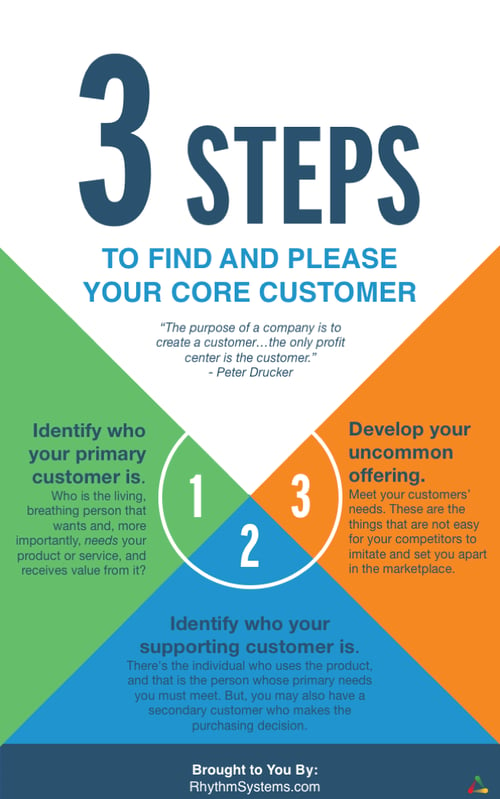Philip Kotler implores us to do a better job of understanding “who” our valuable customers are and then to deeply please them, rather than trying to please everyone. It is much better to serve your Core Customer completely and fully, than to try to be everything to everyone. It will create a core market that you can please and creates a loyal fan base. The core customer value to your business is immense, so the better you understand them the better the return on your investment.
Every company should have a brand promise that it makes to its customers. The promise should differentiate you in your market and support the sales process by making it easier to close deals. The first step in developing your brand promise is to identify and define your core customer. The better job you do with this step, the more effective your brand promise is going to be and the more likely your prospects are to purchase a product. This is needed for business to business and business to consumer companies who want to attract and keep their most valuable customers.
In Peter Drucker's Five Most Important Questions, questions two and three are: "who is our customer?" and "what does the customer value?" These come right after the question, "what is our mission?" Without thoroughly understanding our customer, we cannot carry out the mission of the organization or accomplish our BHAG - Big Hairy Audacious Goal.
Peter Drucker stated, “The purpose of a company is to create a customer…the only profit center is the customer.”
Robert H. Bloom describes the core customer as, “The 'Who' that is most likely to buy your core product or service in the quantity required for optimal profit.”
Core Customer Value Infographic:
Core Customer Value: Identify who your primary customer is
Who is the living, breathing person that wants and, more importantly, needs to purchase your product or service, and receives value from it? Take the time to reach out to this individual and get to them know him or her intimately. After you define your core customer, spend time with them on location; observe them using your offerings. Learn what is valuable and what is superfluous. What are their demographics, likes, dislikes, and aspirations? What will make them successful in their jobs; what are their risk factors? What are their long-term goals? How can your offerings help achieve their goals? How is your product used? What quality and performance characteristics must it have? Will our core product work or do we need to introduce an augmented product? Will we be able to produce it with high quality in large quantities? How many product levels will we need to support our customer base? Will they receive the core benefit of the product? Does your product development team keep this primary customer in mind when developing products?
Core Customer: Identity who your supporting customer is
There may be more than one core customer for your product or service. There's the individual who uses the product, and that is the person whose primary needs you must meet. But, you may also have a secondary customer who makes the decision to purchase a product. You need to meet their needs as well. I have a good example from one of my clients in manufacturing. The person who uses my client's product is the engineer; this engineer must specify my client's product to be used in the design and manufacture of their product. The engineer does not actually purchase my client's product, though. The engineer recommends the product to the purchasing manager. So, the purchasing manager must also be satisfied and is the one who actually buys. For my client, understanding the purchasing manager's needs are also important, which may be price, availability, lead time, inventory stock levels, etc. You need to make sure that your product management teams deeply understand both your core customer and secondary customers to make
Core Customer Value: Develop your uncommon offering to meet your primary and secondary customers' needs
You might leverage your core competencies to do this. These are the things that are not easy for your competitors to imitate and set you apart in the marketplace. As Jerry Garcia of the Grateful Dead once said, we are not the best at what we do; we are the only ones that do what we do. This is a great position to put your company in to retain your customers and keep them loyal. Once you have developed your uncommon offering, you will want to test it on your core customer to ensure it meets their needs and provides value. Again, this must be accomplished for both primary and secondary customers.
“So in the end, we must master our knowledge of who are the target customers, who and what influences them, and how to create highly satisfying customer experiences.” - Philip Kotler
This article outlines a three-step approach to identifying and defining core customers. The first step is identifying the living, breathing person who needs and will receive value from your product or service. Take time to get to know this individual intimately, including their demographics, likes, dislikes, and aspirations. Step two involves developing an uncommon offering that meets the primary and secondary customers' needs by leveraging your core competencies. Finally, test the offering on the core customer to ensure it provides value. By taking these steps, companies can better understand their target customers, what influences them, and how to create highly satisfying experiences for them.
Watch this short video to learn more about defining your core customer values.
Editor's Note: This post was originally published on April 17, 2016, and has been updated.




